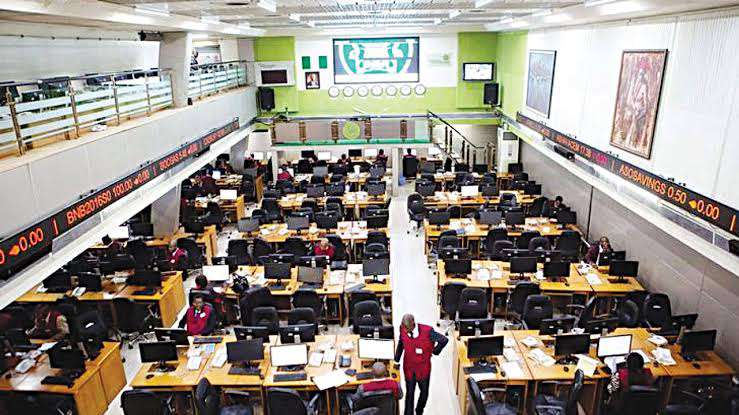Business
NSE’s new corporate identity excites investors

- But experts warn about potential challenges
By EMEKA EJERE
Investors are whetting their appetite in eager anticipation of the forthcoming corporate transformation of the Nigeria Stock Exchange, NSE. Preparations have since reached advance stage to change the legal status of the NSE from a mere trading market where investors buy and sell stocks into an investible company whose shares will be quoted on the exchange in the process called demutualization.
The NSE will convene a mandatory Court-Ordered Meeting (COM) of its members to pass requisite resolutions for the demutualisation of the exchange. The exchange will also hold an Extraordinary General Meeting (EGM) to pass the resolutions for the appointment of inaugural board members of Nigerian Exchange Group Plc., post demutualisation of the Exchange.
According to the Exchange, both meetings (COM and EGM) will hold on March 3, 2020 in Lagos. Technological advancement in the financial world over the last two decades has significantly increased competition among stock exchanges globally and this competition has pressured many exchanges to adopt business models, which have greatly improved their efficiencies and effectiveness.
Demutualisation is the process by which a member-owned company is converted to a shareholder-owned company in which third party investors can participate. This conversion will allow the NSE carry on business activities with the aim of making profits just like regular corporate entities. It will also allow the company to put in place a board of directors to oversee its operations.
The first exchange to get demutualised was the Stockholm Stock Exchange in 1993. After that, many exchanges have demutualized. This includes the major stock exchanges like New York Stock Exchange, Chicago Mercantile Exchange, London Stock Exchange, Australian stock Exchange, Deutsche Börse, Toronto Stock Exchange, and Singapore Stock Exchange among others.
Members of the NSE, which include dealing members and others, had approved for the exchange to embark on the demutualisation scheme at an EGM in March 2017. Specifically, members of the exchange authorised its National Council and Management to proceed with the process leading up to the demutualisation, subject to applicable laws and regulations and obtaining the approvals of members and the relevant regulatory authorities.
They also ratified the engagement of financial advisers, legal advisers, tax advisers and any other adviser that may be required for the demutualisation of the exchange. This was followed by the signing of the Demutualisation of The Nigerian Stock Exchange Bill sponsored by Mr Ayo Tajudeen , then chairman of the House Committee on Capital Markets, into law by President Mohammadu Buhari, in July 2018.
In line with international best practices and standards, the Act authorises the NSE to convert to a shareholder-owned public company limited by shares (public limited company or Plc). This is in a bid to diversify the operations of the NSE and increase its access to capital.
In December 2019, the c in a No Objection letter gave its consent to the NSE’s planned conversion from a not-for-profit entity limited by guarantee into a profit-making, public limited liability company owned by shareholders. With SEC’s approval necessitating the proposed COM and EGM by the exchange, the journey towards demutualizing, which is very close to the end, will face no more hindrance.
At the moment, the NSE is registered as a company limited by guarantee, which is owned and operated by its members alone. As a company limited by guarantee, the NSE has no share capital, hence it has no shareholders. In addition, the Companies and Allied Matters Act (CAMA) restricts the operations of a company limited by guarantee to the promotion of commerce, art, science, religion, sports, culture, education, research, charity or other similar objects. The CAMA also prohibits the division of the undertakings of a company limited by guarantee into shares and the distribution of interests or profits thereon.
Speaking during the 2019 market review and outlook for 2020 held in Lagos last month, Chief Executive Officer of NSE, Mr. Oscar Onyema, said the time for the demutualisation of the exchange was very close by. He gave the assurance while responding to questions from stockbrokers, who wanted to know how soon the process of demutualisation of the NSE, which had commenced since 2015 would materialise.
Onyema enthused that with the No Objection from SEC the exchange has met the necessary requirements of the SEC and would be able to proceed to the final stages of the demutualisation process.
“We have also sensitised our stakeholders on the process of demutualisation and its effects and will continue to engage with them during this process,” Onyema said.
The benefit
Speaking on the expected gains of demutualising the exchange, Mr. Onyema, said, “Our effort at seeing the demutualisation to completion is fuelled by our commitment to developing a more agile exchange that is better able to support the economic growth of Nigeria. We are confident that post-demutualisation, the NSE will be better equipped to diversify our operations and evolve into a more competitive, robust and liberalised stock market.”
Mr. Onyema said the demutualisation of the NSE will generate substantial motivation for the development of an agile exchange thereby consolidating its innovativeness and strengthening its leadership both at local and international levels, whilst also adding value to its stakeholders.
“As a demutualised entity that is profit-seeking, the NSE will be in a better stead to capitalise on new income opportunities, free from any limitations arising from conflicting member interests and existing laws and more importantly be able to better support the economic growth of Nigeria,” Onyema stated.
For Mr. AigbojeAig-Imoukhuede, former President of the Council of NSE, the “demutualisation of the exchange would bring the Nigerian capital market at par with other international jurisdictions, result in enhanced governance, transparency and visibility, while attracting strategic partners, investors and good quality issuers. These are historic times indeed.”
Reacting to the development, Managing Director, APT Securities, Mallam Kurfi Garba, said that demutualisation will reactivate idle capital in the market, adding that it will change the perspective and drive more growth for the economy
Kurfi who was speaking during the Capital Market Correspondents Association of Nigeria (CAMCAN) first quarter forum in Lagos on February 12, said:
“It is a good thing and all of us are going to be happy at the end of the day because it is going to unlock more capital for the market. For instance, if I place shares as collateral, I can trade and make money. We are pleased this is coming after so much delay, this will change the economy’s perspective as well”.
Market analysts, Pam Hughes and Ehzan Zargar, in 2006 listed the benefits of demutualisation of a stock exchange thus:
“Firstly, demutualisation results in more flexible governance structure fostering decisive action in response to changes in the business environment. Secondly, it leads to greater investor participation in the governance of the exchange. Thirdly, it yields an improved platform in response to potential competitors in the form of alternative trading systems.
Further, demutualisation allows greater flexibility and access to global markets. Fifthly, it also facilitates faster and more complete consolidation of stock exchanges to enhance available synergies. And finally, it ensures increased access to resources for capital investment raised by way of equity offerings or private investment less likely to experience endemic market speculation and manipulation or be threatened by systemic failure.”
In his piece titled, “Why does it matter to demutualise the stock exchange?” a professor of capital market, Uche Uwaleke, noted that a demutualised stock exchange may take different organisational forms. He said while some exchanges have demutualized and become public companies listed on their own exchanges such as the Australian Stock Exchange; other exchanges have demutualized but remained private corporations like the Amsterdam Exchange and the Toronto Stock Exchange.
On the benefit of demutualization, Prof. Uwaleke said, “One vital feature that is expected to accompany the NSE demutualisation is greater flexibility in decision-making. The exchange is better equipped to make timely decisions for market users, and to respond to changing circumstances. Financial decision-making is optimised through the allocation of resources to business initiatives that increase the shareholders’ value.
“Indeed, studies have shown that demutualised exchanges exhibit higher levels of profitability and operating efficiency than mutually-owned exchanges. Thus, the NSE demutualisation is expected to bring about better performance of the exchange.”
Between regulatory role and profit maximisation
However, Prof. Uwaleke has his reservations since NSE will be both an operator and a regulator. “On the flip side, although demutualisation has many benefits, it is not without some risks considering that ownership and trading rights are separated. In fact, it can be argued that the very motivation to earn profit intensifies conflict of interest.
“Stock exchanges usually act as a self-regulator and their regulatory functions cover the areas of trading, market manipulation and members’ activities. A company aiming to maximise profits and dividends for its shareholders may have less incentive to commit resources for self-regulation or to take enforcement action against its customers who are a source of income.
“So, there is always the possibility that regulatory functions may be sacrificed on the altar of profit maximisation. In order to address these challenges, demutualised exchanges are encouraged to evolve strong governance structures to minimize the associated conflicts.”








